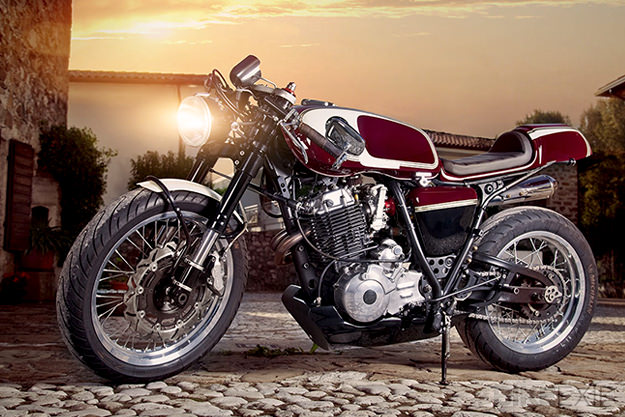
Lying forgotten in the corner of a garage in Italy, this 1988 Yamaha XT600Z was on life support before Christian Moretti of Plan B Motorcycles decided to apply the defibrillators. Not that he wasn’t up for the challenge. According to Christian, Plan B was born from a philosophy of Nothing To Lose. “Everything can be shaped, improved upon and expanded,” he says.
The first step in the resurrection was his favorite part: dismantling. “Everything away, one piece at a time until you leave the bare chassis.” Once that task was done, there was no turning back.

He started off with a pair of Showa 43mm upside-down forks taken from a Ducati 916, disassembled, overhauled and anodized black. The original hubs were laced to new San Remo aluminum rims with a 18″ front and a fat 17″ at the rear. The new road-oriented wheels and tires required a reinforcement to the XT600Z rear end to eliminate possible twisting. So a handmade truss runs across the top of the swingarm, surrounding a Ducati 1098 adjustable mono-shock.

The clip-ons, bicycle leather grips, and clutch and brake levers were borrowed from an old BSA. Christian then modified them to work with the radial master cylinder that controls a Brembo 4-pot caliper—required for the new 320mm floating discs.
The electrical system was revised and streamlined. Almost all the controls were moved to the top yoke, with three small levers to control the lights. The rev counter was pulled out of the dashboard and slipped into a jug (repurposed from an IKEA tea set!) and securely mounted to the top plate.

Meanwhile, the motor received major first aid. The crankcase and valve cover were completely disassembled and polished. The piston was replaced with a forged high-compression item that increases the displacement to 630cc. With the help of a new camshaft, a machined head, a new exhaust system and a pair of 35mm Keihin FCR flat slide carbs, the old single-cylinder can now handle 9,000rpm.
The headlight came from a Citroën 2CV “found at a local flea market,” with enough room left over to house part of the electrical system. On the top are pilot lights for neutral gear, the turn signals and high beam. The taillight also came from the automotive world, this time from a 1930s Ford Model A. It’s recessed into the Ducati Imola tail.

The tail was modified to adapt to the new frame, and also to make room for the rear indicators. Hidden under the tail is a new gel battery and the other half of the electrical wiring.
The tank comes from a Yamaha XS750, and required hardly any modifications to slip onto the single-beam XT frame. But the new riding position meant the footpegs (now from a Yamaha R1) had to be moved further back, using aluminum supports where the passenger footrests used to be.

The side panels, as well as the front fender, were taken from a Triumph Bonneville, while the belly pan came from a Thruxton. The paint job was done by Barbara of Rumi Custom Paint; she also airbrushed the small logo onto the tank and made a slender thread of gold leaf to separate the burgundy and cream used throughout the bike.
The XT600Z is now christened “Proto-Moto,” and Christian is pleased. “The bike feels light, pushes strong, and descends into corners very well. It seems to have completely forgotten about its off-road past, and likes to consume every inch of tire tread around corners!”
It’s quite a transformation for a bike that was gathering rust and dust in a corner, all but forgotten.
I guess it’s always good to have a Plan B. Head over to Google+ for more images in high resolution.
Wes Garcia is the chief editor of Megadeluxe, an online magazine covering the world of speed, sport and design. Images by Daniele Fontanin.
No comments:
Post a Comment